When did the Premier League season start? Some would say it started on Aug. 15, with reigning champion Liverpool’s thrilling and emotional 4-2 win against Bournemouth. And yes, sure, if you want to be a nerd about it, the new league season technically did indeed begin with the season’s first game. But if you want to be more spiritually correct—and more forgiving of a certain group of soccer bloggers—the Premier League only really “starts” once the transfer window’s musical chairs stops. That happened on Sept. 1, and so here we are with a timely season preview that certainly isn’t late due to “procrastination” or “poor planning” or “Business and Innovation Summit hangovers” or anything of that nature.
In fairness to us here at Defector, this was a particularly bonkers summer transfer window, and so most teams weren’t in anything resembling their final form until the window officially closed. Following this recently concluded international break, league action returns for Matchday 4 on Saturday. The squads are as full and prepared as they will be all year long, before the grind of the season begins to pick players off left and right with knocks, tears, and breaks. Feels like the perfect time to reset and see what each of the 20 teams is bringing to the table this season, no?
There are a plethora of storylines from the very tippy-top of the table—where Liverpool and Arsenal look to battle once more for supremacy (and don’t forget about Manchester City, even if, as we’ll see, the former world-conquerors appear to be in a bit of a transitional period)—to the slew of contenders for the European spots, and no one can forget the dreadful prospect of relegation. Every team has hopes and dreams for its season, at least some of which will come true. At least as many will be bitterly disappointed: managers will be fired, star players will be lost to injury or the market, and malaise might be quickly followed by a catastrophic reversal of fortunes.
There’s no particular reason for why this specific season should be noteworthy, but the busy transfer window will at least make the first few months, with so many players settling into new settings and roles, thrillingly unpredictable. There are enough questions about any and every team’s fate that the mind reels at the mere suggestion of them: Will any of the newly promoted sides manage to beat the drop this time around? What the hell is up with Nottingham Forest? And Manchester United, for that matter? Who will be the second (we’ve already seen the first) manager fired? Which midtable team will make a run at the European spots? What will Tottenham look like in a post–Daniel Levy era? Will Chelsea ride its surprise triumph at the Club World Cup into legit title contention? Can Liverpool, fresh off perhaps the craziest window since prime Chelski, repeat? Will Arsenal finally get over the hump? In fact, let’s start with that last question.
Arsenal
Arsenal is in a strange spot. On the one hand, finishing as runners-up three years in a row is the best string of league results the Gunners have enjoyed since the good Arsène Wenger days. On the other, it’s hard not to feel like Arsenal may have already missed its best chance to get its hands on the big prize. The North London side has finished second to the Manchester City juggernaut twice, which, fair play, there’s no shame in losing to the most dominant side in English soccer history. But the Sky Blues’ unforeseen struggles last season offered Arsenal a golden chance to finally get their hands on the trophy, only for Liverpool to blow them away. Now, up against the refreshed and re-Rodri’d City and the stunningly reloaded Reds, Arsenal has needed a shakeup of its own if it is to have any hope of at last scaling the mountain.
That’s what Arsenal has done this summer. Out went Kieran Tierney, Raheem Sterling, Jorginho, and Thomas Partey, who, after years of speculation, was charged with five counts of rape in July. As replacements, Arsenal signed Martín Zubimendi from Real Sociedad to bolster the midfield, Noni Madueke from Chelsea to provide depth out wide, and Kepa Arrizabalaga from Chelsea to serve as a reliable backup goalkeeper. Not all of these signings look like home runs on paper: Zubimendi should be one, as he slots perfectly into Mikel Arteta’s midfield with ball control and defensive solidity; Madueke awes in flashes but isn’t consistent, and his €56 million transfer fee might burden the 21-year-old with a level a pressure that might be tough to endure; Kepa is Kepa, a keeper capable of stunning runs of form and even more stunning runs of mistakes. Still, though, Arsenal saw where it could bolster its rotations and made targeted signings, something every top club tries to do every summer.
The Gunners’ most important signings of the summer, though, came in the form of Sporting Lisbon’s Viktor Gyokeres and Crystal Palace’s Eberechi Eze. With regards to the former, Arsenal’s biggest flaw in recent years has been the lack of a true, reliable No. 9, a goal-scoring striker at the tip of the spear. Kai Havertz, a natural attacking midfielder, has spent a lot of time trying to fill that role, but he’s not consistently good enough at the goal-scoring aspects to lead the line for a title-winning team. Gabriel Jesus was closer to the ideal, but injuries have limited his availability and lowered his formerly sky-high ceiling as a player.
Gyokeres is sturdy and a born scorer, but he’s not without question marks. He’s built his résumé in England’s Championship and in Portugal’s Primeira Liga, two challenging leagues that nevertheless do not always translate well into Premierleaguese. In his first three games at Arsenal, the results have been mixed. He was invisible against Manchester United in the opening match, similarly impotent in attack against Liverpool, but did score two goals in a 5-0 trouncing of newly promoted Leeds. Gyokeres does have a good history in European play, scoring 11 goals across 17 games in the Europa League and Champions League, as well as nine goals in six games for Sweden in last year’s Nations League. If he gets in gear and comes anywhere near his 39-goal tally from last season in Portugal, then Arsenal’s attack might be the best in the league, especially now that it has also signed Eze.
Eze is a proven commodity in the Premier League, having played at Crystal Palace since the 2020-21 season. He’s not a “score bunches” type of winger (his highest single-season tally is 11) but he can create both with and without the ball at his feet. With Gyokeres in the middle, that’s a threat defenses will have to respect this season, and Eze can further confound opponents by lining up centrally and moving into the channels. In other words, Arsenal has new toys to play with, toys with much more potential than the previous set. Given Mikel Arteta’s preference for controlling games and slogging out three points, having attackers who can score from very little is important. Will that be enough to catch Liverpool and finally, after 22 years, lift the Premier League trophy again? I’ll say no, but I also won’t be surprised if it happens, thanks to the summer Arsenal put together. — Luis Paez-Pumar
Title Contender Index: 85.1
Relegation Candidate Index: 0.7
Aston Villa
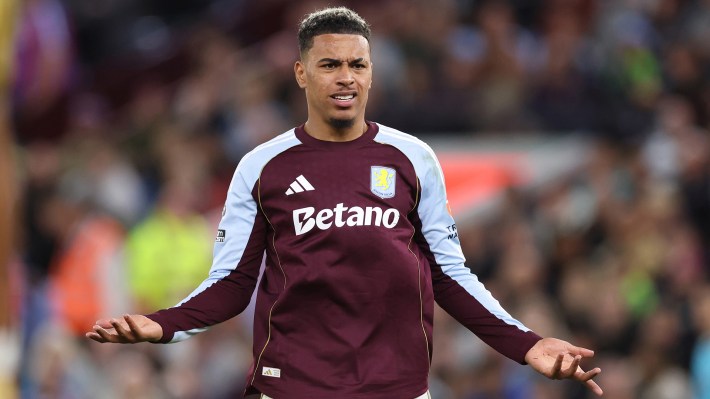
How does one rate Aston Villa’s 2024-25 campaign? I’m inclined to give the Lions of Birmingham their due respect for an incredibly impressive Champions League campaign, first and foremost. In the league stage of the newly revamped European competition, Villa beat Bayern Munich and then won the second leg of the quarterfinal against eventual champions Paris Saint-Germain, coming just one goal shy of forcing extra time at Villa Park. Narrowly falling to the eventual champions of Europe is a feat to value for a club like Villa, and the run into the quarters was Villa’s best performance in the continent’s top competition since 1983, a year after it won its one European Cup.
On the other hand, Villa won’t get the opportunity repeat its UCL performance this season. Thanks to some unfortunate results in the Premier League. the Villans finished sixth last season, outside of the Champions League places. A last matchday loss to Manchester United kept Villa out of the running for a top four spot, though the way results shook out meant that even a win would have still had Villa in fifth on goal-difference tiebreaker behind Chelsea. Still, though, that United loss was a fitting capstone to an admirable but ultimately unsuccessful domestic season, which couldn’t match the ascendance of the same season’s European campaign or the previous year’s run in the league.
That ascendance might be tougher to recapture this year, even though manager Unai Emery is back in his most successful competition: the Europa League. For a club that has done all of the right things to climb into regular top-four contention, Villa had a slow summer, despite not losing too much production in the transfer market. The major headline came from three loan players who returned to their respective motherships, as Marcus Rashford, Marco Asensio, and Axel Disasi all departed, though only Asensio was a crucial part of the squad by season’s end. Incoming traffic might similarly be of small effect, with only OGC Nice’s Evann Guessand looking to feature heavily this coming season. (Villa was also apparently in the running for West Ham’s Lucas Paqueta, but he decided to stay.)
And so, Villa is instead mostly bringing back the same squad for another attempt to finish in the upper quadrant of the table. Given how the club faltered early with extra European responsibilities, I’d be worried about the same thing happening with the Europa League matches this time around. Still, there is a lot of talent here. Youri Tielemans finally found a home in a more advanced midfield position, where his unique playmaking talents could flourish, especially playing with Ollie Watkins up top; the English striker got 16 goals and eight assists last season, his most impactful Premier League campaign yet. Elsewhere, Morgan Rogers has solidified himself as one of the best young talents coming from England, coming off a season where he notched 18 G/A. Boubacar Kamara and Amadou Onana form a stout partnership in the middle, and Tyrone Mings, who is somehow already 32 years old, helms a solid defense ahead of Emi Martínez, should Martínez plays his way back into the manager’s good graces after pushing for but failing to get a move in the offseason. Really, all of this sounds good, but is it good enough to help Villa retain its place in an increasingly crowded top third of the Premier League? It’s hard to say, but the disappointing ending to last season, combined with a summer of mostly idle hands, shows how quickly Villa could fall back into the mid-table without a club-wide effort to keep improving. — Luis Paez-Pumar
Title Contender Index: 5.9
Relegation Candidate Index: 2.2
Bournemouth

The Cherries are coming off their most successful Premier League season ever, at least in terms of points: 56, up from the previous year’s record of 48, a clear upward trend for a side that is solidly midtable and can aspire for even more. But there’s always a “but” with these kinds of teams, and it’s the same “but” that usually plagues modest clubs that overachieve. Bournemouth endured a raid on some of its most impactful players this summer, and now must rebuild without slipping down too far on the table, lest the relegation zone get too close for comfort.
A whopping four out of five members of Bournemouth’s defensive spine from last season have moved on and up this summer. Kepa Arrizabalaga, who was on loan from Chelsea, returned to the Blues just long enough to be sold to Arsenal. Three members of last year’s formidable back line—center backs Dean Huijsen and Illia Zabarnyi, and left back Milos Kerkez—parlayed their excellent seasons to the very top of the game, joining Real Madrid, PSG, and Liverpool, respectfully. Right back was the only position spared, and it’s not a coincidence that right back was the defensive position Bournemouth most often rotated last year, mostly between Adam Smith, Tyler Adams, and Julián Araujo.
The Cherries played an attacking style last season under Spanish manager Andoni Iraola, who has guided the side through its recent uptick in fortune; given the talent drain in defense, Iraola might need to double down on that attack-mindedness this season. Luckily he has the players for it: The front three of Justin Kluivert, Antoine Semenyo, and Evanilson have all returned, and they all scored double-digit goals last season. Semenyo himself has started this season a tear, scoring two goals against Liverpool in the season opener and adding the game-winning assist against Wolves the next match. The Ghana international is a star in the making, and he will be the focal point of the Cherries attack this season.
There are also reinforcements in defense: Bournemouth bought Djordje Petrovic from Chelsea to replace Kepa, and if Iraola and his staff can again coax some sterling shot-stopping out of an ex-Chelsea goalkeeper, the side might not feel the change all that much. Adrien Tuffert was a smart purchase as well, the left back coming over from Stade Rennais for just over €13 million. The center back void should prove harder to fill, but Bournemouth did bring in Bafodé Diakité from Lille. Will that be enough? Hard to say, but Iraola is smart enough to provide whatever combination of replacements with cover from the midfield. I’m not as high on Bournemouth’s chances to keep up its streak of record-breaking points tallies this season, but there’s just too much competence here to truly risk relegation, and after a summer of unsuccessfully fending off raids for its top talent, that might be the best-case scenario for the Cherries. — Luis Paez-Pumar
Title Contender Index: 3.7
Relegation Candidate Index: 17.7
Brentford
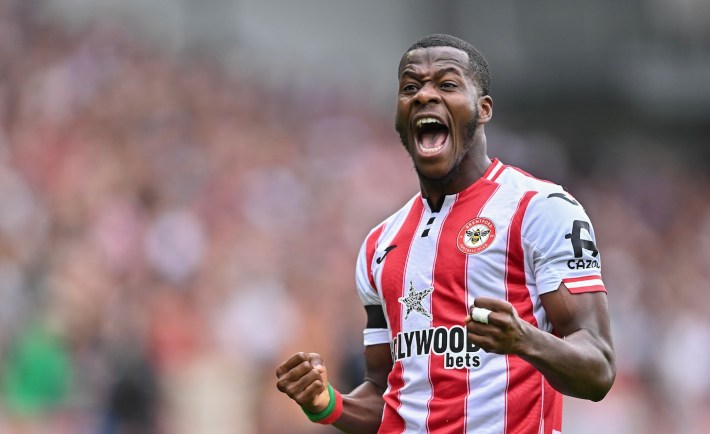
The Premier League loves its Little Engine That Could stories. It is true that it’s basically fair to apply those kinds of narratives about humble teams bravely lugging themselves up the table, powered by little more than a pound and a prayer, in light of the financial chasm that separates the bottom-half clubs from the behemoths at the tippity top. But it’s also true that your typical “scrappy upstart” like Aston Villa or Nottingham Forest or Brighton usually spends what is objectively a fuckton of money in order to be in position to upset the applecart.
Brentford, in contrast, is the rare, true little engine. This tiny club with no appreciable history is always near the very bottom of the league in terms of salary expenditure and net transfer spend. In spite of that, the team has consistently punched above its weight, not only surviving in the Prem but regularly finishing above famous clubs that outspend the Bees by an order of magnitude.
For this, Brentford owner Matthew Benham certain deserves his plaudits. A career gambler, Benham made a lot of money coming up with a statistical formula that outperformed the model that sports bookies used to set their lines. He then parlayed that money and those insights into buying and running Brentford, his childhood team. Benham’s Bees rely heavily on statistical analysis to help them unearth undervalued players and overlooked game strategies, and the proof is in the pudding: not a lot of money spent, and yet massive (comparative) success having stayed up for going on five seasons in a row. Credit to Benham for putting his money where his mouth was, and winning big.
However, I do take issue with the moneyball case that attributes the bulk of Brentford’s success to Benham’s quants and their Excel sheets. To my mind, the true architect of the Brentford teams of recent vintage was long-serving manager Thomas Frank. It was Frank who showed the tactical flexibility to know how to coach a domineering, attacking style when his Bees were one of the most talented teams in the Championship, while also implementing more contextually appropriate defense-minded set-ups when they were up against the giants of the Prem. It was Frank who helped turn low-cost, high-upside transfer bets like Ollie Watkins, Ivan Toney, David Raya, and Saïd Benrahma into stars and then into the big sales that are needed to sustain the club’s business model. It was Frank who converted the quants’ recommendations about set piece routines and the value of long throws into actionable practices that then showed up on the pitch, turning sideline theories into actual goals and wins.
No spreadsheet, regardless of how accurate the formulas therein are, can get a team of individual people to buy in, play hard, and play well, together. Meanwhile, a good coach can manage all of without even having to know what two plus two equals. That is why Frank has always seemed to me like Brentford’s real genius. And that is why Brentford seems to me to be in real trouble now that he’s gone.
Another point in favor of Frank being the man most responsible for Brentford’s EPL success is that the club’s analytics-based recruitment system hasn’t turned up very many hits lately. Just about the best thing you can say about the list of the Bees’ most expensive signings ever, the vast majority of which have come over the past couple seasons, is that the jury is still out on most them. Even the more successful additions, like Mikkel Damsgaard for instance, needed a year or two of Frank’s tutelage before they started to really show their abilities. With Frank gone, and with star forwards Bryan Mbeumo and Yoane Wissa also no longer around to carry the day, Brentford will quickly learn if first-time manager Keith Andrews can coax good performances out of recent (comparatively) big-money signings like Dango Ouatarra, Igor Thiago, Kevin Schade, and Fabio Carvalho. I’m not sure if Bretford has what it takes to stay up and thereby validate Benham’s particular brilliance for steering a club. But I wouldn’t bet on it. — Billy Haisley
Title Contender Index: 0.04
Relegation Candidate Index: 61.3
Brighton & Hove Albion
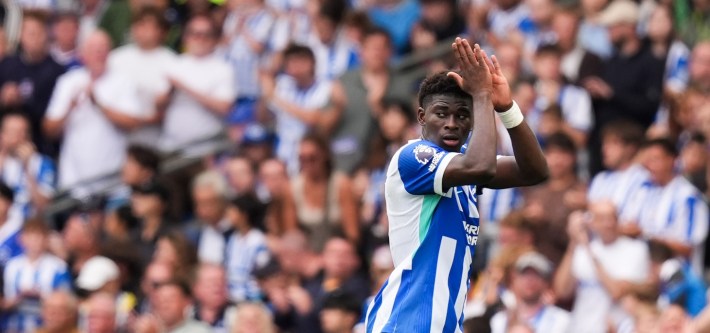
Speaking of the Bees, Brighton is pretty much what Brentford hopes to be when it grows up. Brighton is also owned by a former sports gambler who figured he could beat not only the bookies but also actual sporting directors, and he has proven himself right. Brighton has one of the most successful scouting departments in Europe, is constantly signing promising young players and then selling them for staggering fees after cultivating their talent, and, after the departure of multiple beloved managers and sporting directors and star players, has already established that the Brighton system, and the attendant success, will go on no matter who leaves.
Thankfully, Brighton hasn’t lost too much from last season to this one. Star forward João Pedro did make his inevitable leap to the continent’s richest clubs this summer, signing with Chelsea. The Brazilian’s absence will certainly hurt, but the Seagulls were fortunate to hang onto their other superstar-in-the-making, Carlos Baleba, who at a certain point during the offseason looked more out than in at the club. Baleba is one of the coolest central midfielders in England. Like many physically imposing black midfielders, he’s often stereotyped as a rote destroyer who’s all legs and motor, and while the Cameroonian is certainly a terrifying presence on the defensive end, it’s his talent with the ball that really makes him stand out. He is one of the league’s great deep ball-carriers, and combines his exquisite dribbling technique with a polar toenail’s chillness, which he uses to weave past high presses as if they didn’t exist. He has a fantastic eye for the Hollywood pass over and through the defense, and his ability kick the dick off of the ball means he’s always a threat to pop up with a goal of the week contender.
Brighton had a strong season last campaign in spite of a slew of injuries that kept the year’s outcome from being truly special. Should Brighton stay healthier this time, and if Greek wonderteen Charalampos Kostoulas hits the ground running in João Pedro’s place, this year could well see Brighton back in Europe. Regardless, so long as Baleba is still there, I will be there to watch what he can do. — Billy Haisley
Title Contender Index: 9.3
Relegation Index: 22.3
Burnley
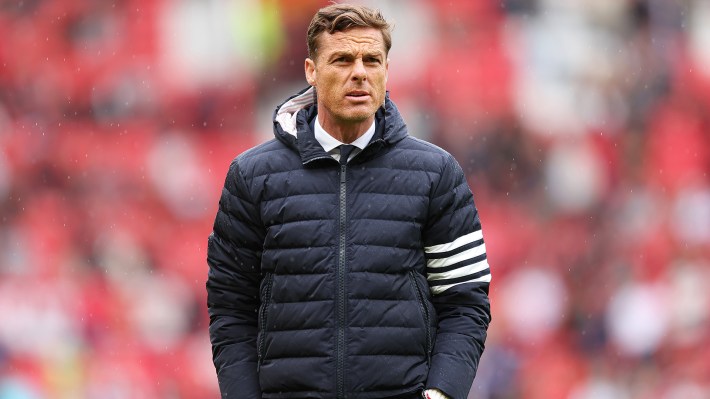
Burnley is the new Norwich City. This is not a compliment, but it is also not an insult. It’s just the reality for the Clarets, who have assumed the Canaries’ old mantle as the preeminent yo-yo club.
Burnley is back in the Premier League after just one season away, having stomped through the Championship with a 100 points, only finishing second to Leeds United on a goal-difference tiebreaker. Keen observers of Burnley—surely there are at least some of you out there—will remember that the club won the Championship with 101 points in 2022-23, under the management of Vincent Kompany. Despite the impressive record in the second tier that time, the club’s subsequent top flight season was poor: 24 points, 19th place, and a spot right back down to the second division.
Kompany somehow turned that debacle into a managerial position at Bayern Munich, but in his place, Scott Parker replicated the Championship success and now must avoid Kompany’s failures in the Premier League. He has a tough task ahead of him: Burnley greatly over-performed its xG in attack and defense last season, and though 100 points is 100 points, Leeds looked like the much better team all year. Burnley’s best asset is its stalwart defense, which only allowed 16 goals in 46 matches, easily the best record in the division (Leeds was second with 30).
Parker relies on a steady defense without much pressing, and Burnley is the exact type of defensive squad that could survive its first season back up top; there’s no adventure here, and that’s the way Parker likes it. But where will the goals come from? I’m not sure the club has a good answer to that question, and so, even with an above-average defense for a newly promoted side, the Clarets might just repeat their trip down to the second tier on the puffs of smoke that come from its attack, particularly with the departure of 18-goal scoring midfielder Josh Brownhill. — Luis Paez-Pumar
Title Contender Index: 0.0
Relegation Candidate Index: 89.9
Chelsea

Chelsea is the biggest villain in soccer today. Even more than the obscene, non-sporting financial power of the petro clubs, the multi-club ownership model is the most nefarious influence in the sport. Chelsea, more than any of the other multi-club clubs, is the most intent on abusing the system to skirt the rules and distort the competition.
The apotheosis of this phenomenon was, to me, when Brighton attacker Julio Enciso was reportedly nearing a transfer to “BlueCo”—not to a team like Chelsea or Strasbourg, the two clubs that make up their parent company BlueCo’s soccer portfolio, but just to BlueCo itself. The reports said Enciso would spend a season in France’s Ligue 1 at Strasbourg, and then join Chelsea. Was this a loan from Chelsea to Strasbourg? Was Strasbourg going to buy him from Brighton and then Chelsea would buy him from Strasbourg after? Can a multi-club-owning consortium just buy players on its own now and ship them around wherever they please? What kind of heinous, FFP/PSR-dodging nonsense is this!
(Probably because of the naked corruption of the “BlueCo” framing, Enciso eventually just signed a normal deal with Strasbourg, though you know that the ultimate plan is the same as before.)
Chelsea in the BlueCo era loves these kinds of financial shenanigans. It’s clear that BlueCo sees the club the way its private equity backers see the rest of the world, as an asset to squeeze for all its juice, and the surrounding industry and governing rules are just things to game and undermine in order to advance their interests. Academy players are resources to sell off for pure profit and fund new transfers for often mediocre players. New signings are opportunities for transfer fee arbitrage, where you guy 10 guys this summer with no real intention to integrate all of them into the team but rather in hopes that you can sell eight of them the next year and make a tidy profit. Contracts should be long and incentive laden, that way it shrinks amortization costs while also making it potentially easier to run players off by showing them how little they’ll play and get paid if they don’t agree to leave. If the players don’t go where you tell them, then it’s off to the bomb squad. It’s such a dehumanizing approach to the sport, and I hate it.
What I especially hate is how many players I really like are trapped on this club I can’t stand. A team with Cole Palmer, Enzo Fernández, João Pedro, Moisés Caicedo, Estêvão, and Reece James should be like my favorite team in England! And yet I can’t stand watching them play, in part because of everything the BlueCo vampires represent, but also because the manager, Enzo Maresca, is an asshole and doesn’t even get the most out of all those cool guys! And my anger and skepticism of the wisdom of it all doesn’t even matter, since the club really has just happened upon so many legitimately great players that the team is a lock to be good—though not title-contending good, I don’t think—regardless! Fuck you, Chelsea! — Billy Haisley
Title Contender Index: 30.1
Relegation Candidate Index: 10.1
Crystal Palace

A year ago, we told you that Crystal Palace gets a royalty payment every time the phrase “12th in the table” is mentioned in any context, and lo and behold, there they were again. But not all 12th-place finishes are created equal, which explains the delirious joy of Palace’s 12th-place, FA Cup–winning, Community Shield–lifting past few months. That FA Cup triumph also came with an entry ticket into this season’s Europa League competition, only for the club to then be relegated to the Conference League because they had too many owners, or at least an owner who owned too many clubs, even if he no longer owns this one. This is a club that must be careful even in celebration, as any strong vibrations are liable to crack the encasing glass.
Things got hilariously worse with the news that New York Jets owner Woody Johnson bought double-dipping minority shareholder John Textor’s 43-percent stake ($254 million, give or take the odd quid), and is only waiting for the Premier League Rubber-Stamp Subcommittee to pass its approval onto the standing “Woody Johnson? THAT Woody Johnson? Can We Approve this Yesterday?” Board. To put it another way, this sentence actually appeared in the New York Post:
“The purchase must be ratified by the Premier League through the Owners’ and Directors’ test, although that process is widely expected to happen quickly and without issue, given Johnson’s experience owning the Jets.”
“Johnson’s experience owning the Jets?” Let that rattle around in your brain for a moment. Actually, for the sake of your brain, don’t. The Jets have not appeared in the playoffs in 15 years and have not played a home playoff game in 22. In his quarter century owning the Jets, the team has the 25th-best aggregate record, which if you stand on your head makes them eighth, which is better than 12th if you don’t mind the nosebleeds and dizziness. Who wouldn’t want that level of genius in your boardroom, even if it isn’t one of his kids?
Palace’s best feature is manager Oliver Glasner, who has made them a strong enough side to win an FA Cup and only allow one goal in six matches to do so, and even owner Steve Parrish gets it after Glasner threatened to quit if Palace let Marc Guéhi go to Liverpool without first bringing in a replacement. Guéhi didn’t go to Liverpool and has apparently agreed not to be obnoxious about it, but there is always another transfer window around the corner. Eberechi Eze did go to Arsenal, which is a blow, but Palace has begun the year with a convincing win and two defensible draws which has them in eighth at the first international break. This won’t hold because of the Rule Of Twelfth, of course, but Palace might end up being the most fun team of them all. When was the last time you said that about Arsenal? Or the Jets? — Ray Ratto
Title Contender Index: 0.0, because 12th
Relegation Index: 0.0, because 12th
Everton
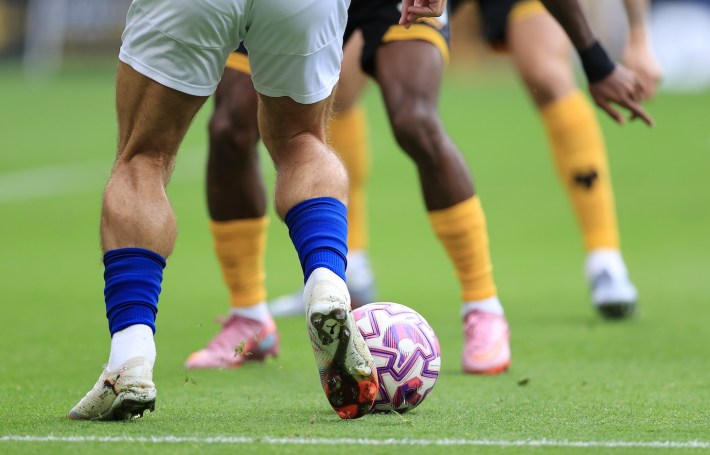
Maybe this time Everton will actually have a normal season.
Fans of this team have been whispering the above sentence to themselves every summer for what feels like an eternity. Last August, I really thought it was going to come true: Sean Dyche had spent the second half of the previous campaign turning Everton into a competent if unglamorous outfit that seemed capable of coasting to a midtable finish. Yet as soon as the 2024-25 season kicked off, it all went to hell. Dyche’s Everton was immediately plunged into yet another relegation scrap, and by January he was fired and replaced by club legend David Moyes.
Moyes then got to work turning Everton into a competent and (somewhat? maybe just a tiny bit?) glamorous team that finished in 13th place, 23 points clear of the relegation zone. It was a remarkable turnaround, made all the better by the fact that the team was finally sold to a competent ownership group and finally finished construction on its new money-pit stadium, which the team christened with a 2-0 win over Brighton in August.
Moyes is still here, obviously, and he is currently trying to solve the biggest problem that has plagued Everton for the last decade: not having good players. The upshot of all the financial woes inflicted on this team during Farhad Moshiri’s ownership tenure is that the squad got thinner and worse every season, but now a new ownership group and a new stadium have arrived to try and reverse that trend. To that end, Everton did some genuinely good business before the transfer window shut: Young, gigantic French striker Thierno Barry came over from Villarreal, Kiernan Dewsbury-Hall was signed from Chelsea, Carlos Alcaraz made his loan from Flamengo permanent, and 19-year-old starlet Tyler Dibling was poached from Southampton. The biggest prize of all, though, is Jack Grealish, who arrived on loan from Manchester City and already has four assists in two Premier League starts. The last time Everton signed a semi-washed superstar and put him into a team where he could do whatever he wanted, James Rodríguez had the Toffees in second place by Christmas. Grealish looks to be following in those same footsteps.
Grealish, and the freedom that should be afforded to him, will at the very least make Everton worth watching. So too will Iliman Ndiaye (whose unique, somewhat janky dribbling style makes his ball-progression game particularly fun to see) and Dibling (who plays like Grealish but is 10 years younger). I really can’t overstate how important this injection of attacking talent is—Everton had to play games last season in which Jack Harrison, Abdoulaye Doucouré, and Dwight McNeil were the three “attackers” behind the striker. Now they have the kind of advanced players who can, for the first time in almost a decade, produce goals like this:
— Tom Ley
Title Contender Index: 0.9
Relegation Candidate Index: 50.0
Fulham
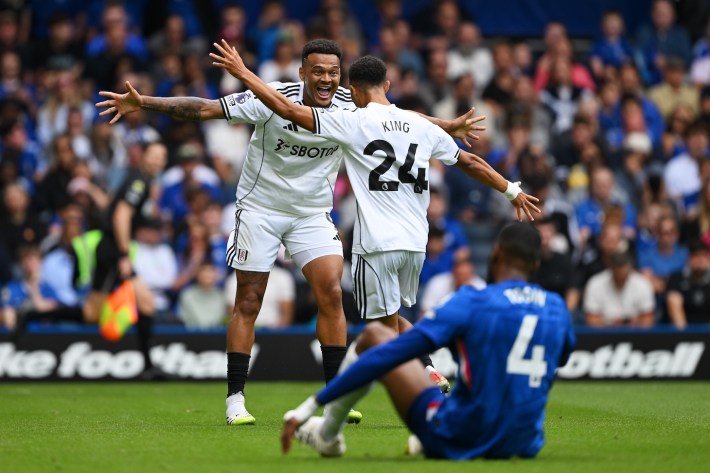
Fulham is a good example of how little thanks the Premier League has to offer to teams that do a lot of things right. Relegated at the end of the 2020-21 season, Fulham appointed Marco Silva as manager and trusted him to build the team he wanted. Fulham was the best team in the Championship during Silva’s first season in charge and came roaring back into the Premier League with confidence, where they bucked the recent trend of promoted teams going right back down by finishing 10th in 2022-23. Since then they have barely budged from that spot, finishing 13th, 11th, and 10th in the three subsequent seasons.
A team of Fulham’s size seizing and then successfully defending a spot in the middle of the table is a laudable accomplishment. But like so many teams that have been in this position before, the Cottagers are starting to approach their ceiling. Fulham has stayed competitive these past few seasons thanks to canny roster construction and Silva’s ability to get the most out of his players, but those things can only carry you for so long. Every squad is a depreciating asset that needs to be regularly replenished, and nothing eases that process along better than raw spending power, of which Fulham does not have much.
And so Silva spent all summer justifiably kvetching about the fact that the people above him weren’t signing any new players. Benjamin Lecomte, a 34-year-old backup keeper, was the lone newcomer for weeks until Fulham’s execs finally got active during the last week of the transfer window. Kevin, a delightfully named Brazilian winger, became the club’s record signing after he was pried away from Shakhtar Donetsk for €40 million. A loan deal for winger Samuel Chukwueze provides some more depth on the forward line, and 18-year-old striker Jonah Kusi-Asare, who arrived on loan from Bayern Munich, could be a fun project.
The starting XI that played so well last season is mostly intact, but a year older and without a ton of reinforcements behind them. On the plus side, the lack of depth has made space for 18-year-old academy graduate Josh King in Fulham’s midfield, where he’s been running the show in his three starts. Unfortunately for the young fella, his first Premier League goal was wiped out by one of the worst VAR decisions in history.
Fulham has yet to win a game this season, but has played competently enough in both of their draws and their loss to Chelsea. There’s no reason to doubt that Silva will have them playing competently and competitively every week, but Fulham’s longer term prospects will only dim as his angst with the overall direction of the club grows. — Tom Ley
Title Contender Index: 0.6
Relegation Candidate Index: 37.7
Leeds United
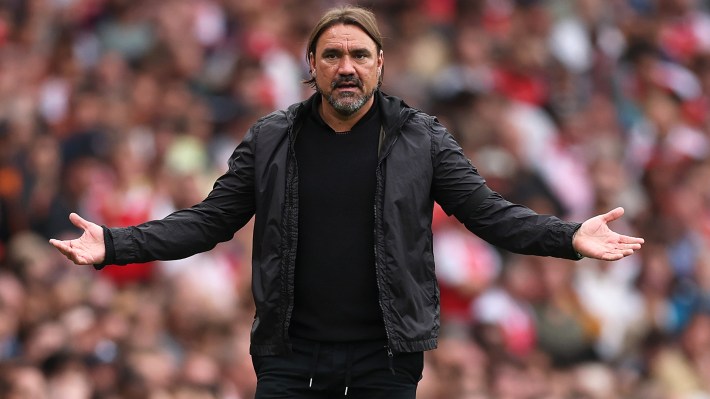
If Burnley is the new Norwich City, then Leeds is I guess the new Norwich Plus. The best team in the Championship last year, the Peacocks have at last moved on from the disastrous end to the legendary Marcelo Bielsa era and the even worse Jesse Marsch regime. Leeds is now managed by Daniel Farke, formerly of … Norwich. Farke has done this two times before: He won the Championship with Norwich in 2019 and in 2021, but finished in the relegation zone in the COVID-striken 2020 season and was fired with Norwich struggling in 2022. The Canaries were then relegated, and they haven’t gone back up since.
Farke will be looking to change his luck with Leeds, and he has a better side than he ever did at Norwich. This is a fun and exciting group, capable of scoring goals in bunches. Of course, “fun and exciting” has drawbacks for teams at risk of relegation, as any newly promoted side is. A recent example: Ipswich Town was promoted on the strength of 92 goals in the Championship and promptly finished with a minus-46 goal difference in its first and only Premier League season. Leeds should do better than that, but only if Farke is adapt or change the high-flying style that has earned him much success in the Championship but regularly gets his teams relegated from the big league.
There is attacking prowess here, though: The trio of Joël Piroe, Daniel James, and Wilfried Gnoto can all stuff the stat sheet. The club will Manor Solomon, on loan from Tottenham last season, and his 22 G/A contribution. Brenden Aaronson is also still here! The American was a good goal scorer, with nine last season, but at this level he’s likely more of a rotation option than a regular starter.
Regardless if Leeds goes down or not, though, the club should be more entertaining than it was in the latter stages of its previous Premier League tenure. At the very least, Farke has been here before and should understand the pragmatism needed to survive the jump from the Championship, and I think that Leeds should be the most likely of the three promoted sides to stay up. It’ll be a challenge, but there’s potential here for this season and beyond. — Luis Paez-Pumar
Title Contender Index: 0.0
Relegation Candidate Index: 80.3
Liverpool
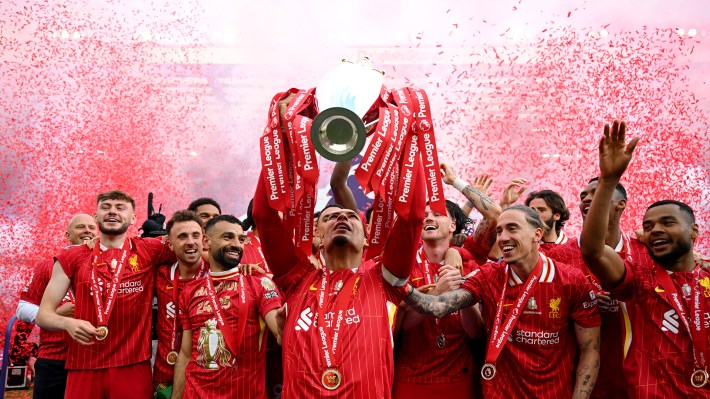
How did Liverpool follow up the extremely successful Jürgen Klopp era, the one that brought the club its long-awaited first Premier League title ever? By switching directly to the extremely successful Arne Slot era, the one that brought a second title in what was supposed to be a transitional year. The former Feyenoord manager stepped into Klopp’s shoes and made them his own, transforming Liverpool from a chaotic storm into a suffocating machine, one that squeezed the life out of opponents in the midfield and one that, crucially, still had Mohamed Salah at the very peak of his powers. Salah scored 29 and assisted 18 more in one of the best statistical seasons the Premier League has ever seen.
How does the club top that in 2025-26, with a bullseye firmly planted on its forehead and with a list of outgoing players (Trent Alexander-Arnold, Darwin Núñez, Luis Díaz) that doubled as a list of major players in the title run? (This is not to mention the tragic death of Diogo Jota, who was similarly important to the team.) Well, for starters, Liverpool absolutely blacked out in the transfer market this summer, spending more than any other club in the world and certainly more than it ever had before. The club bought six players worth over €30 million this summer, with three at or above €95 million: in ascending order, Hugo Ekitike (€95 million), Florian Wirtz (€125 million), and, after a prolonged transfer saga, Alexander Isak from Newcastle for an English record €145 million.
(The other three signings, for posterity: full backs Milos Kerkez and Jeremie Frimpong, and center-back prospect Giovanni Leoni.)
Those additions were like a klaxon announcing that the reigning champions have no intentions to rest on their laurels, and instead went and made the league’s best team even better. Through three matches, Liverpool has been undefeated but not perfect. Wirtz has been a bit slow to come to speed and the defense has already had two awful performances (against Bournemouth and against Newcastle), though it toughened up against Arsenal, holding last year’s runner-up to a clean sheet.
There are real concerns, but damn it if it’s hard to find any reason for serious concern here. Ekitike has hit the ground running, scoring two goals and notching an assist already. Wirtz looked fantastic in the second half of the Arsenal game. Kerkez got bullied against Newcastle but then completely shut down Arsenal’s right wing. Dominik Szoboszlai, a midfielder by trade, has deputized at right back due to an injury to Frimpong, and has somehow become Liverpool’s best player (he also scored a worldie of a free kick to beat Arsenal). Salah has been slow off the mark, despite an opening matchday goal, but he never stays quiet for too long. And, again, I must also reiterate that Alexander freakin’ Isak is now here. Questions of positional and formational fit aside, that man can score goals in bunches, and Liverpool likely has the best attack in the world at its disposal.
Will that lead to a repeat at the top of the Premier League? Maybe! It’s also possible that Liverpool’s somewhat rickety depth hammers them throughout the year, and that the defense never shapes up. It’s also possible that the new signings fail to gel together, and that playing so much attacking firepower puts too much of a strain on the team out of possession. But these are “problems” that 19 other teams would kill to be “plagued” with. Liverpool has to be considered the favorite to win the league this year, if only because talent and money usually win out. Thanks to spending a metric ton of the latter, Liverpool now has the former in spades, and whether it ends in a title or not, there will likely not be a more exhilarating team to watch this season. — Luis Paez-Pumar
Title Contender Index: 92.2
Relegation Candidate Index: 0.20
Manchester City
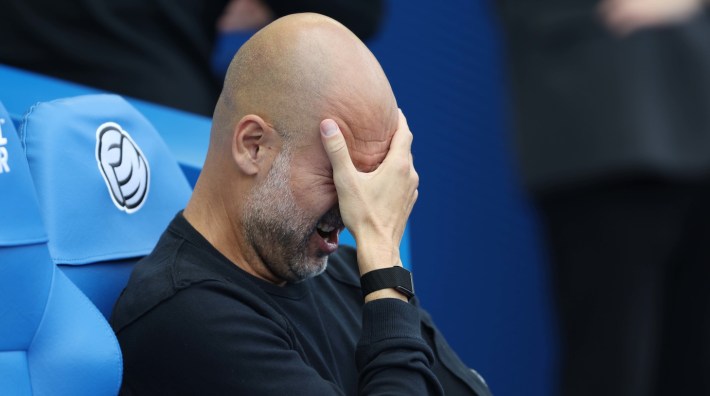
As a dyed-in-the-wool Barça boy, I have been, am, and will always be a Pep Guardiola stan. There is simply no arguing with the facts of his unparalleled success. His teams’ best seasons rank amongst the very best years the sport has ever seen, and even his down years would qualify as pretty good for any other manager. He’s changed how an entire generation of fans, analysts, and even coaches see the game. Every big club, when looking for a new manager, first considers whether he might be available, then tries to gauge which of his assistants or former players may have absorbed enough of his genius and aura (extra points if the acolyte has also shaved their head) to be the best bet to become the next Pep, and, if no satisfactory candidate emerges from those criteria, they just go for the guy who can do the best Pep impression. The popular understanding of what great, beautiful play is, and the ability of a manager to achieve it, is all to a large part defined first by looking to his career. His influence is outrageous.
All that being said, I think it is a good thing that the almighty Pep has seen his reputation take a hit over the past year. For the first time ever, Guardiola oversaw a team that was actively, inexplicably bad for large stretches, and it was clear that he was totally incapable of stopping the slide. This has punctured the mythical notion of the all-powerful manager that Guardiola has come to represent. I am in favor of this deflation, because I think this mythical notion is bunk. Managers are good—and can be great even, as Guardiola’s undeniable record shows—but, in terms of influence on the actual play on the field, they pale in comparison to the players, to whom the game truly belongs.
The great success of Man City’s teams over the past decade is, of course, in part due to Guardiola’s ability to maximize his team’s collective strength by putting his players into an effective tactical system, but it is mostly because Man City always had some two dozen extremely good players, who cost and charged some two trillion dollars to acquire and pay, who were so good that they could run over everybody. Somewhere along the way, large chunks of the public have gotten confused and believed that it was more Guardiola than the players. Last year, when City no longer had so many extremely good players—Rodri, the designated best player in the world, missed the whole season with an injury; usually reliable stalwarts Kevin De Bruyne, Bernardo Silva, Ilkay Gündogan, Jack Grealish, and Phil Foden had down campaigns; recent additions like Savinho, Jérémy Doku, Rico Lewis, Matheus Nunes, Nico González, and Abdukodir Khusanov weren’t ready or able to compensate to the needed extent—they played badly. It’s my hope that the reality last season illuminated—that even Pep GODiola is beholden first and foremost to the talent of the players available, and he does not in fact possess some magical tactical wand that can turn any rando into prime Andrés Iniesta—will get people to reconsider how much stock they place in any manager’s importance and instead give more credit to the players.
Fortunately for my “managers don’t matter as much as commonly believed” agenda (and unfortunately for my Pep standom) it would seem that Man City has not entirely solved its dearth of great players problem. De Bruyne, even in noticeable decline, was still hugely important for City last year, and he’s gone now. Silva might just be washed now. Savinho, Doku, González, Lewis, Nunes, and Omar Marmoush might just not be good enough to uphold City’s previous standard of greatness. Rodri might take a long while getting back to his best, and we’ll have to see when or if Foden can get back on track, too. New signing Rayan Cherki is impossibly cool, but is he good enough to fill KDB’s massive shoes?
When I compare City’s roster to the other title contenders’, and especially to Liverpool’s, I see far more guarantees in the red jerseys than in the sky blue ones. Guardiola is great at noticing a player’s strengths and figure out how to get the most out of that talent, so it wouldn’t be a shock if City does turn things around and win the title. But whether City makes another title run this season or once again struggles to hold onto a Champions League spot, when looking to dish out credit or blame for their fate, you’re best served looking more at the players than the manager. — Billy Haisley
Title Contender Index: 72.7
Relegation Candidate Index: 8.5 (are those 115 charges ever going to get resolved??)
Manchester United

If you want the comprehensive explanation of how Manchester United fans feel about Manchester United these days, there is this. Not to mention this. Nobody hates Manchester United more than Manchester United, and that starts with Sir Jim Ratcliffe and all his we’re-going-broke bullshit, and goes all the way down to those infants in Man Utd gear that NBC insists on showing us every week before they hit us with the same three ads over and over. Ruben Amorim, who hates his team more than last year’s (and that one didn’t lose to Grimsby Town) still has his job despite offering to quit every day at lunch. The fans hate the owners and players, the coach keeps ramming his theories through players who either won’t or, more likely, can’t facilitate them, the stadium hates the fans and, other than media pundits who treat the Red Devils like the Dallas Cowboys, nobody can be caught saying one nice thing about them.
And why? Because they have underperformed their reputation on a galactic scale. They’re not famous because of the name any more, but because of the shame.
Which is why the Aug. 6 Athletic piece explaining how they still found more than €200 million to sign Bryan Mbeumo, Matheus Cunha, Benjamin Sesko and goalkeeper Senne Lammens could have been headlined “Why Man United Isn’t As Fucked As They Keep Saying They Are.” Of course they are, because fucked is a mindset, and reputation is only useful until it becomes an anvil in your shorts on a day at the beach.
While United has won both the FA Cup and League Cup in the last two years, they have not been relevant based on their own view of themselves on a global scale in years, and their hatred for their ownership, coaching staff and players has reached such extremes that they have not only overtaken traditional Hooligan Cup powerhouse West Ham for arrests but beat them by a comfortable margin. It is a victory for a team starved for success, even if that success involves bail money and court appearances, and well done to the fan base for saying what needs to be said—that the operation has become almost an ouroboros of hate.
Is Amorim a terrible hire because he is stubborn about ramming square pegs into round holes and dynamiting an expensive roster, or is he a great hire because the roster deserves to be dynamited again as a reminder that dynamited money is exactly what Manchester United under the Glazers and Ineos deserve? The headline is Chicken Plays Egg To Scoreless Draw, and the story below it has never been more riveting. This year will ratchet all that bad feeling up because Man U is nowhere near done flogging itself with tire chains with Alex Ferguson’s face on them. They may not be bad enough to be relegated, but they should be, if only to give their ownership, their manager, their players and fans what they have all longed to have—not a championship but The Championship. And they’re still not as good as Grimsby Town. — Ray Ratto
Title Contender Index: 0.0
Relegation Candidate Index: Same, though if there were a supernatural being who loved us all, it would be 96.4.
Newcastle United
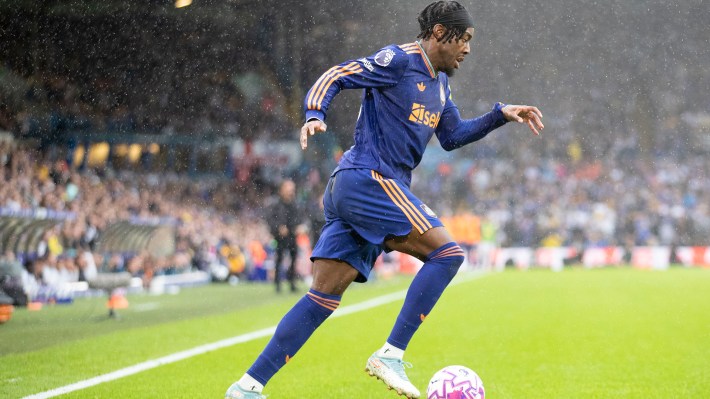
This was not a fun summer for Newcastle United, and it had a lot to do with Liverpool. I wrote about that here already, but the long story short is that Newcastle seemed to be aware that Alexander Isak was not going to be a long-term solution at striker, thanks to a reported (and later consumated) desire to move to the Merseyside Reds. So Newcastle, backed by more money than anyone in the Premier League, went hunting for a replacement … only to lose its first choice, Hugo Ekitike, to the same Liverpool that would later sign Isak. Add in the saga with their Swedish striker, and yeah, it hasn’t been a great time.
That’s not to say that Newcastle is screwed, though. Despite not getting its first-choice striker replacement, the Magpies did spend a lot of money this summer to bolster its attack. Between the signings of Yoane Wissa from Brentford, Anthony Elanga from Nottingham Forest, and Nick Woltemade from Stuttgart, Newcastle spent €204 million to upgrade its forward line this summer. (You can also add in €45 million for Aston Villa’s Jacob Ramsey, for fun.) Can those three, plus returning goal-scorers like Harvey Barnes, Anthony Gordon, Bruno Guimarães, and Joelinton, make up for Isak’s 29 goal contributions last year? That might be the defining question of the Black and Whites’ season.
Elsewhere, Newcastle will try to improve on its solid-but-not-elite defense from last season (47 goals against was seventh in the league, but the worst of the Champions League–qualifying sides). There are no real reinforcements there, so the quartet of Dan Burn, Fabian Schar, Tino Livramento, and Kieran Trippier will need to step up their games as Newcastle goes back into the top European competition after a year away. So far, Newcastle has given up three goals in a 3-2 loss to Liverpool, but has shut out both Leeds and Aston Villa. The Magpies will need every bit of improvement they can manage to avoid what happened the last time they played in the Champions League, when it finished seventh domestically in the 2023-24 season. — Luis Paez-Pumar
Title Contender Index: 3.3
Relegation Candidate Index: 3.3
Nottingham Forest
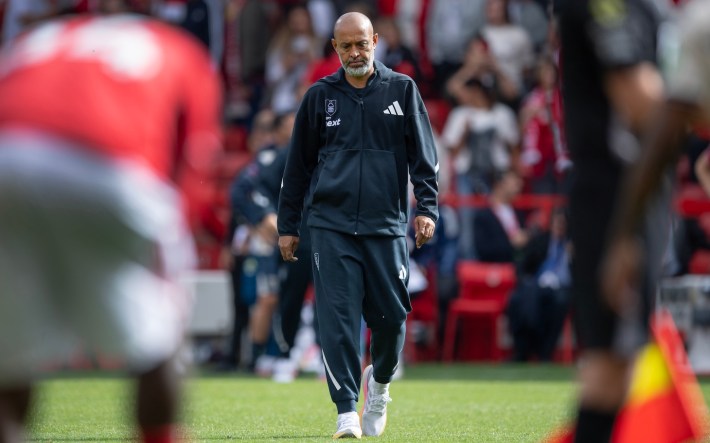
If you’d told me two years ago that Nottingham Forest would win at Anfield, give Brighton a “mare,” and get into Europe, I would have said, “What is Nottingham Forest? What is Anfield? Brighton? A mare?” (I was familiar with the continent of Europe.) If you’d told me these things one year ago, I would have said, “Really? MY Nottingham Forest? My new chosen Premier League team that all my soccer-knowing colleagues have informed me is bad and not worth following??? WOW!!! Very interesting! Seems Luis Paez-Pumar is the one having a mare!!!”
I would have been less surprised to learn that this dream season for the Tricky Trees was still limned with disappointment and capped with dysfunction: They finished seventh in the table after holding a Champions League spot for much of the season, and then manager Nuno Espírito Santo was fired on Monday after his feud with the team’s completely insane owner, Evangelos Marinakis. The Trees have now hired Ange Postecoglou, late of Tottenham. He inherits a team with plenty of cool guys: versatile attackers in Callum Hudson-Odoi and Morgan Gibbs-White, and the revived Chris Wood, who especially thrived under Nuno and was up there on the Golden Boot table last year. Anthony Elanga has, sadly, died. Under the reign of Ange, the team’s slow-ish center backs—the lovely Murillo and Nikola Milenkovic—will have to do a lot of running around and may soon be dead as well. — Maitreyi Anantharaman
Title Contender Index: 0.0000001
Relegation Candidate Index: 83.1
Sunderland

It’s the team from the TV show! (No, not that one. The less-annoying one.) That’s right, baby, Sunderland is back in the Premier League for the first time since the 2016-17 season. Back-to-back relegations sent them all the way down to League One, and they’ve spent the last seven seasons clawing their way back up the soccer pyramid. It hasn’t been a pretty journey—they finished 16th in the Championship in the 2023-24 season and fourth place last season—but a successful run through the promotion playoffs has brought them here.
Are they going to be any good? You would assume no, given that Sunderland wasn’t even that strong of a Championship side and finished last season with 24 fewer points than fellow promoted sides Leeds and Burnley. But these cool Cats completed an eye-popping roster overhaul during the transfer window—£167.1 million spent, 15 new players in, 17 players out—and now employ some genuinely good players, including electric winger Simon Adingra (last seen among Brighton’s collection of cool youngsters) and highly rated midfielder Habib Diarra. Oh, and Granit Xhaka is here, too! You remember that guy, right? Somehow this team was able to convince him to leave Bundesliga powerhouse Bayer Leverkusen in favor of getting his shins kicked in the Northeast of England. We’ll see how he feels about that decision in January.
The new squad is already paying dividends. It’s never been harder for promoted teams to stay up—everyone just sort of expects the three promoted sides to go down without a fight these days—and it was easy to write Sunderland off as the worst of this year’s trio of patsies. But they kicked the season off with a 3-0 drubbing of West Ham, stumbled a bit with a 2-0 loss to Burnley, and then got back on track with a 2-1 win over Brentford. Having six points on the board by September is huge for a team in Sunderland’s position, and gives them real hope that survival can be achieved. At they very least, it signals they won’t be just another promoted speed bump for the rest of the league to run over; last season, promoted sides Ipswich Town and Southampton had five points combined after nine games. — Tom Ley
Title Contender Index: 0.0
Relegation Candidate Index: 87.6
Tottenham Hotspur
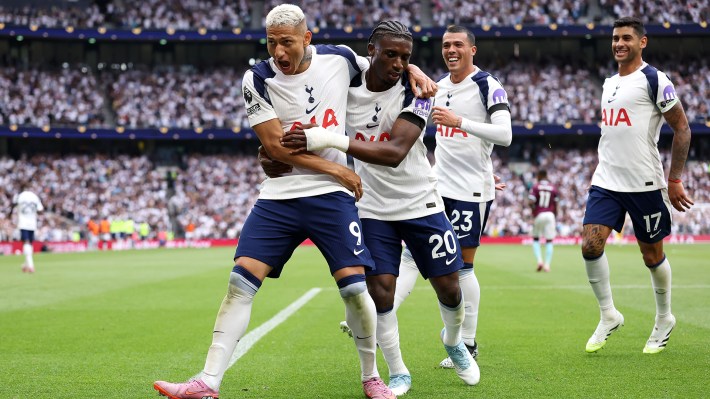
I had a whole plan for what to say about Tottenham Hotspur in this preview. It’s been a big summer in North London. Ange Postecoglou was fired, despite winning the Europa League last season, and replaced by Brentford’s Thomas Frank. Son Heung-min left the club and moved to Los Angeles. Tottenham looked to be set to sign Eberechi Eze from Crystal Palace, only to get pipped by those dastardly Gunners. The club did make three big attacking signings this summer, converting Mathys Tel’s loan from Bayern Munich into a permanent transfer, getting Mohammed Kudus from West Ham in July, and then locking up Leipzig’s Xavi Simons a few days before the transfer window deadline. Replacing Son culturally will likely be much harder, but Tottenham has more than enough talent, and a steadier coach than Postecoglou in Frank, to continue playing attractive and productive soccer.
Anyway, I was going to write about all that, and then Daniel Levy was fired left his post as Tottenham’s executive chairman after 24 (!) years. The news broke on Sept. 4, after the transfer window had closed, and so Levy’s departure won’t have an immediate effect on Tottenham, at least in terms of the on-field product. However, more than anyone—more than Harry Kane, Son, Mauricio Pochettino, Gareth Bale, and all of the other important characters of this era—Levy was the central figure in Spurs’ fortunes, for both good and bad. Levy was a famously stubborn negotiator whose tactics drove other Premier League figures to madness—Manchester United manager Alex Ferguson once called negotiations with the Spurs boss “more painful than my hip replacement”—and was able to keep players and coaches at Tottenham for far longer than one might have expected. Case in point: Kane was only sold to Bayern Munich in 2023 after years of dogged pursuit from Manchesters City and United, as well as Real Madrid.
Levy’s negotiation style surely cost Tottenham plenty of players, given his reluctance for paying anything above what he decided was the price. It might have cost Tottenham Eze, though the English attacker also seemed set on Arsenal anyway. The effects of the chairman’s departure will likely start to creep in during the January window, and certainly by next summer. To me, it feels like this was a long time coming. Levy had his style, and it worked for a long time, but it also might have stalled Tottenham’s full ascent into the very elite of English soccer.
Back to the actual club: Tottenham started the season doing its favorite thing (beating Manchester City) and then its usual thing (losing, 1-0 to Bournemouth). Kudus notched two assists in the first hour of the season, and both Richarlison and Brennan Johnson have a pair of goals a piece. Defensively, the back four and goalie Guglielmo Vicario have given up one goal in three matches, and generally, Tottenham has looked more in control coming off the disarray of last season. Frank is the ultimate pragmatist, who found consistent success at Brentford even when greatly changing the team’s style of play depending on the level of the opponent and the particular qualities of his own squad. With more talent to play with at Tottenham, he shouldn’t find it too difficult to help push the team back into the upper reaches of the table. What happens after that will have as much to do with Frank and his players as it will with whoever replaces Levy, though, so I won’t make any bold predictions about the second half of the season and beyond. — Luis Paez-Pumar
Title Contender Index: 11.1
Relegation Index: 4.4
West Ham United
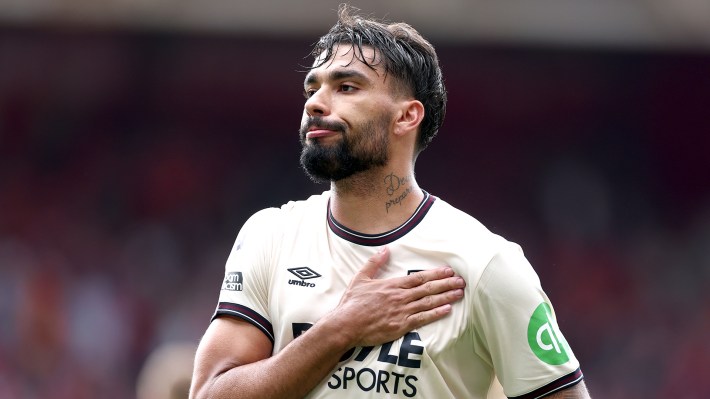
There’s not much to say about West Ham heading into this year, and I mean that as negatively as possible. The Hammers have fully slipped into the bottom half of the Premier League, and even a mid-season managerial change from Julen Lopetegui to Graham Potter didn’t do much to right the ship. West Ham finished 14th last season, and it was a dire 14th that maybe went under-represented thanks to the bigger failures from Manchester United (15th) and Tottenham (17th), but make no mistake: West Ham was bad, and looks to be bad yet again this season.
The summer has not been kind to the East London side either, as perhaps its best player, Mohamed Kudus, moved over to Tottenham for €64 million. Kudus wasn’t as productive last season as the year before, seeing his G/A drop from 14 to eight, but he still provided the most dynamism in a static attack. West Ham will miss his runs and pressures from the right wing, even if Jarrod Bowen continues his quiet run of excellence across the attacking band (13 goals and eight assists last season, after a 16 and six season in 2023-24). Other than those two, though, West Ham’s attack was limp, notching only 46 goals, the third-worst tally from the non-relegated teams, ahead of only United’s 44 and Everton’s 42.
West Ham did use the Kudus money to make a few big signings this summer, but defender Jean-Clair Todibo, Slavia Prague winger El Hadji Malick Diouf, and Leicester goalie Mads Hermansen does not make for an inspiring summer haul despite a combined €83 million price tag. Potter has a lot of bang average players, with only Bowen and Lucas Paquetá to provide moments of inspiration. That formula didn’t really work last season, so it would be surprising if it does this season. West Ham might be the biggest beneficiary of how large the money gap has grown between the Premier League and the Championship; in a previous era, the Hammers would be a relegation candidate, but there just might be a bit too much talent here to drop below the three newly promoted teams.
Still, though, this is a mediocre side in need of something, anything to get excited about, and I’m not really finding that something, anything. Potter has had success with limited resources before, but his stock is trending downwards after a disastrous Chelsea tenure and an uninspiring finish to his first West Ham half-season. I feel comfortable penciling West Ham into some place between 13th and 17th on the table, and it would only take a few wrong breaks for the club to fear for its safety up until the tail end of the season. — Luis Paez-Pumar
Title Contender Index: 0.1
Relegation Candidate Index: 60.1
Wolverhampton Wanderers

For years now, Wolves has been little more than a way station where superagent Jorge Mendes parks players from his impossibly large client list as he ferries them up and down the streams of the global soccer market. Is a Mendes client underperforming at a big club and in need of a change of scenery, somewhere he might get his groove back and convince a different big club to sign him away? Send his ass to Wolves! Is a Mendes client performing well for a smallish club, knocking on the door of a big transfer, but hasn’t yet quite convinced one of the big boys to pull the trigger, and therefore would benefit from a showcase season in the world’s richest and most visible league? Send his ass to Wolves! Is a Mendes client at a big club impeding a potential transfer of a separate Mendes client to the same club, and therefore said big club could use an outgoing transfer in order to fund the incoming transfer, a sizable chunk of both fees heading Mendes’s way via agent fees? Send one of those asses to Wolves!
Being a pawn in the great chess game of the transfer market isn’t the most noble of fates for a proud club like Wolves, but it’s not the worst thing in the world, either. The team has been the (temporary) home of some major talents over the years due to Mendes’s machinations, and few of those guys likely would’ve found their way to the Midlands if not for the club’s status as a Gestifute front. I’m sure other EPL bottom-half dwellers would’ve appreciated the opportunity to get a front-row seat to the Matheus Cunha show for a couple years before selling him on for a hefty profit, as Wolves did when Manchester United bought him for some £60 million this summer. Being used isn’t without its perks.
Now, I don’t think the Mendes-Wolves relationship—one that had strained some recently, though the ties appear to have been re-strengthened when Wolves sacked manager Gary O’Neil midway through last season and replaced him with Mendes client Vítor Pereira—is particularly good for the health of the game. But what I do know is that, as a non-Wolves fan, I don’t really care too much either way. My main interaction with Wolves, outside of hoping that whatever big talent Mendes has brought to town comes good so I have a new cool guy to watch out for, has been checking their starting line-up on any given weekend to see how close they get to fielding an entire XI made up of Portuguese speakers. The Mendes connection means Lusophones—be they of the Portuguese, Brazilian, or learned-it-while-playing-in-Portugal-or-Brazil varieties—tend to be wildly overrepresented on Wolves rosters, as cheekily memorialized with the club’s Seleção-inspired alternate jersey a few years ago. I find this fact to be funny, and so I always make a point to count up how many Portuguese-speakers are on the pitch for them. I can’t remember if I’ve ever spotted an all-Lusophone XI, but I do know that they’ve gotten close several times.
To that end, I am worried about Wolves this season. Not about their relegation odds, which, again, as a non-Wolves fan I don’t really care about. Instead, what worries me is that they have lost seven likely Portuguese speakers (I’m uncertain whether Spaniard Pablo Sarabia picked up the language during his loan spell at Sporting Lisbon, but I’m counting him anyway) and signed only one in return. Granted, that incoming falante de portugûes is Jhon Arias, who joined the club from Fluminense this window and who I have long carried a torch for due to his exploits with Flu in the Copa Libertadores and the Club World Cup, as well as his role in the current, super cool Colombia national team. I think very highly of Arias’s skills, and I would love to see him ball out, in the same way that I enjoyed watching Cunha kill it over the past couple years.
However, it’s always a crapshoot whether flashy imports who thrived in very different contexts can transfer those performances into the muck of the Premier League midtable, so I’m not holding my breath for a succession of Arias masterclasses. Similar promise/concern surrounds Mendes client Fer López. The 21-year-old Spaniard comes to England off the heels of an auspicious breakout season for Celta Vigo, but he probably would’ve been better served staying in Spain, where he could continue to hone his talent in an environment proven to be conducive to him.
Wolves should be too good to go down this season. Then again, I usually feel that way every season and yet they somehow find themselves mired in the trenches before a managerial change and a Mendes-directed transfer influx lifts them to safety, so who knows. And even if Arias and López come good and Wolves hits its ceiling, finding itself in the thick of the fight for one of the single-digit table spots, I’ll miss the stupid, pointless pleasure of speculating on Os Lobos line-ups’ language tendencies. — Billy Haisley
Title Contender Index: 0.1
Relegation Candidate Index: 36.6